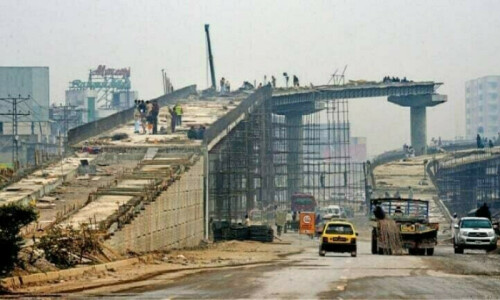ISLAMABAD: The Asian Development Bank (ADB) has approved a $400 million concessional loan for the reconstruction of houses and infrastructure damaged by the floods of 2022 in Sindh, the lender announced on Friday.
The Sindh Emergency Housing Reconstruction Project is “a key part of ADB’s multifaceted response to Pakistan’s flood crisis”, ADB said in a press release.
The project is included in the overall support of $1.5 billion, which the bank would provide to Pakistan from 2023 to 2025 to accelerate the flood recovery.
“This project will help rebuild homes and communities, and restore livelihood and basic services in Sindh, the province most affected by the devastating 2022 floods,” said ADB Director General for Central and West Asia Yevgeniy Zhukov.
Project will rehabilitate 250,000 houses in Sindh with resilient, responsive designs
“It is part of ADB’s extensive support to help Pakistan recover from the disaster which affected 33 million people and damaged houses and infrastructure across the nation.”
The project will support conditional cash grants for the reconstruction of 250,000 houses “with multi-hazard resilient and environment-responsive designs”.
It will also support community-driven construction of infrastructure such as drinking water facilities, sanitation facilities, covered drainage, and renewable energy solutions for 100,000 households in around 1,000 flood-damaged villages in Sindh.
Conditional cash grants for livestock, agriculture, small enterprises, and e-commerce are also part of the project.
According to ADB, the floods resulted in widespread damages in Sindh, where about 83pc of the total housing infrastructure was damaged, with around 2.1m houses either fully destroyed or damaged.
Two years on, many victims are still living in inadequate, temporary shelters lacking essential services such as water, sanitation, and electricity, the press release added.
“ADB’s support will not only help Pakistan build back better, but it will also promote community-led climate resilience and disaster risk management strategies to better prepare for future hazards,” said ADB Director for Water and Urban Development Srinivas Sampath.
“We are coordinating closely with other development partners to support the government’s recovery and reconstruction priorities.”
A $500,000 technical assistance grant will further support the government’s operational capabilities in procurement, safeguard compliance, and technical and financial management, the lender added.
The project in Sindh is based on the Post-Disaster Need Assessment finalised by international aid agencies. It is being executed through the newly incorporated firm, Sindh Peoples Housing for Flood Affectees, for the rehabilitation of damaged and destroyed houses in 24 districts of the province.
The loan is part of the portfolio jointly funded by ADB and the World Bank for Sindh’s housing reconstruction following the 2022 floods. According to need assessments, $16.3bn is needed for rehabilitation and reconstruction, including $7.9bn for Sindh and $2.345bn for Balochistan.
Published in Dawn, July 27th, 2024














































Dear visitor, the comments section is undergoing an overhaul and will return soon.